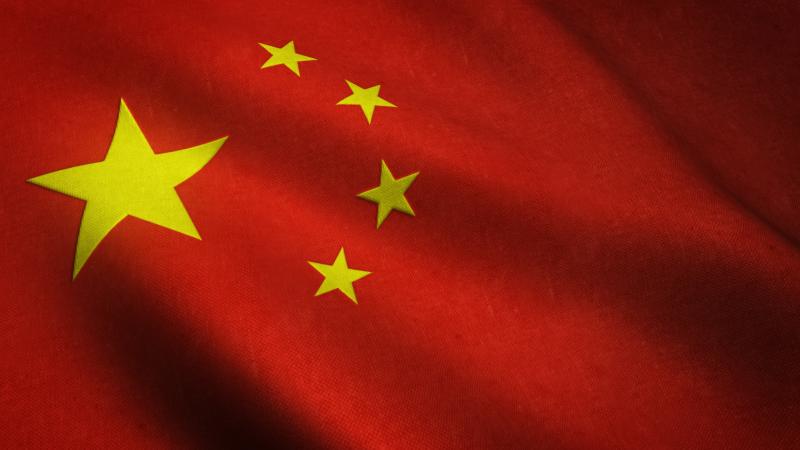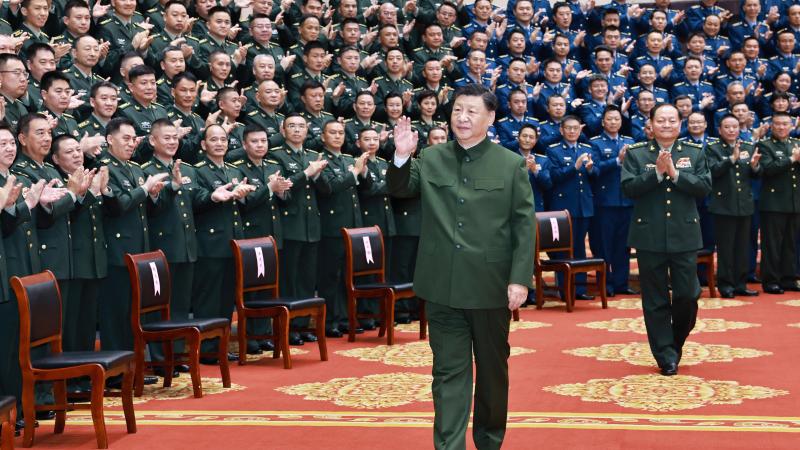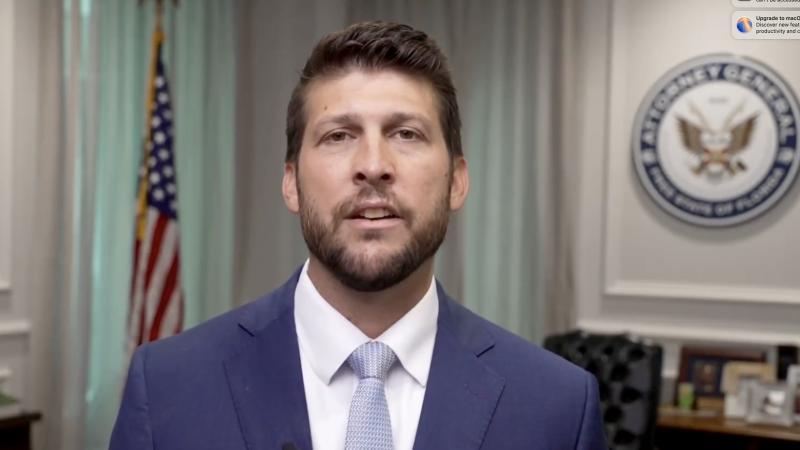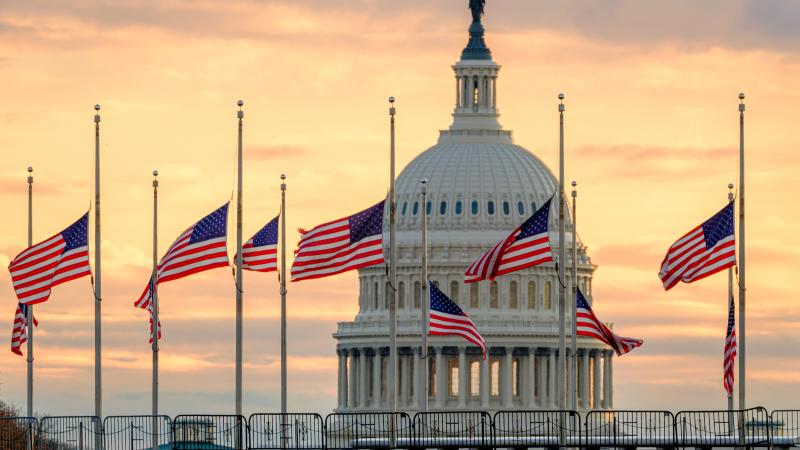From ‘Made in China’ to ‘Owned by China’: 20 deals show how China is gobbling up U.S. assets
Between 2002 and 2016, Chinese state-owned or state-linked companies acquired more than $120 billion worth of assets in 40 states across the U.S.
U.S. lawmakers are seeking how to address growing American supply chain concerns amid the global coronavirus pandemic. In addition to most consumer goods and electronics, China reportedly manufactures "more than 90% of U.S. antibiotics, vitamin C, ibuprofen and hydrocortisone, as well as 70% of acetaminophen," among other crucial drugs imported by the U.S.
Sen. Rick Scott (R-Fla.) has become one of the most vocal critics of the Chinese Communist Party and has urged a boycott of goods made in China. “We have to pass a law: Stop buying anything from Communist China,” Scott said in a recent interview. "Nothing. Don’t buy any products from them."
However, a boycott of goods made in China would do little to address growing Chinese influence over American interests achieved via investments, mergers, and acquisitions. Between 2002 and 2016, Chinese state-owned or state-linked companies acquired more than $120 billion worth of assets in 40 states across the U.S. Just 15 Chinese entities (sovereign wealth funds, state-owned corporations, or state-linked private sector firms) accounted for 60% of this activity. In 2016 alone, more than 50 of these Chinese acquisitions exceeded $50 million. Several Chinese takeover deals exceeded $1 billion.
Here are 20 Chinese investments and buyouts that have consequences for American consumers (and potentially 2020 election voters):
1. Reddit — China’s Tencent Invested $150 Million in 2019
- Online social forum Reddit (majority-owned by Conde Nast publishing) received $150 million in funding from China's Tencent. The investment is "an odd pairing between one of the architects of China’s Great Firewall of censorship and one of America’s most lawless free-speech forums," wrote TechCrunch’s Josh Constine. Reddit has since placed the most popular pro-Trump subreddit, The_Donald, in "quarantine," where it effectively ceased all activities.
2. TikTok — Viral video platform owned by Chinese company valued at over $100 billion
- China’s ByteDance created TikTok in September 2016 and launched the millennial-friendly social network on the iOS and Android app stores in 2017. In October 2018, TikTok became the most downloaded app in the U.S. — the first Chinese app to do so — and ranked among the 10 most-downloaded apps in the last decade (with the likes of Facebook, Twitter and Instagram). TikTok users were recently praised by Rep. Alexandria Ocasio-Cortez (D-N.Y.) for helping to disrupt a Trump campaign event in Tulsa, Okla.
3. Universal Music Group — Tencent bought 10% of UMG in December 2019 for $3.4 billion
- China's Tencent bought a major stake in the California-based “Big Three” record company for a whopping $3.4 billion.
- UMG owns the rights to most of the world’s most popular artists, including Taylor Swift, Lady Gaga, Ariana Grande, Post Malone, Billie Eilish, Queen and The Beatles (among thousands of other worldwide global music stars).
- This year, Tencent bought 10% of Warner’s publicly available shares (or 1.6% of the entire company) for $200 million, with the option to double the purchase for the same price.
5. Riot Games — Tencent purchased 93% of Riot in 2011 for $400 million
- Riot Games produces the world’s most popular PC game: League of Legends (LoL). In 2015, Tencent bought the remaining 7% for an undisclosed sum. When Riot Games would not cooperate with Tencent’s demand to make a mobile LoL platform, Tencent cloned the software and produced their own version of the game.
- Tencent also owns 40% of Epic Games (creator of “Fortnite,” which pulled in $2.4 billion in 2018, making it the world’s most profitable game), 11.5% of Bluehole (PlayerUnknown's “Battlegrounds”), and significant chunks of Activision Blizzard (“World of Warcraft”), Ubisoft (“Assassin’s Creed” and “Far Cry”), and even distributes the infamous “Candy Crush Saga,” among other popular games in the U.S.
- In 2018, Tencent joined several other investors in a $150 million funding round for Discord — a popular chatroom app used by video gamers.
6. AMC Theaters bought out by Wanda Group in 2012 for $2.6 billion
- In 2012, China’s most Hollywood-focused M&A machine, Dalian Wanda, bought the popular movie theater chain AMC Entertainment Holdings for $2.6 billion. AMC was founded in Missouri more than a century ago and has 300 locations across the United States. Now owned by China, AMC was hit hard by the COVID-19 pandemic and has said that a bankruptcy filing is “likely.”
- Other American movie theaters and movie studios have received heavy investment from the Chinese as well, including Dick Clark, Carmike and Starplex Cinemas (all invested in heavily by Dalian Wanda), Dick Cook (CITIC), Studio 8 (Fosun), and Steven Spielberg’s Amblin Partners (undisclosed investment from Alibaba as part of $300 million group funding round).
- The takeover by Dalian Wanda in 2016 for $3.5 billion was the largest Hollywood-China deal to date.
- As the Wall Street Journal reported, the deal “significantly expands Wanda’s presence in the global entertainment business, as it now owns one of the largest independent movie companies in Hollywood.”
- China’s influence became apparent when Legendary Entertainment began planning to make more films in China, including a series of Godzilla films and a Chinese co-production starring Matt Damon titled “The Great Wall.”
- Virginia-based Smithfield Foods owns a variety of household names, including Nathan’s Famous Hot Dogs, Cook’s hams, Farmland, and Healthy Ones. Smithfield is the world's largest hog farmer and pork processor, and its products are sold in approximately a dozen countries.
- At the time, Shuanghui’s deal with Smithfield was the largest takeover of a U.S. company by a Chinese buyer.
- Notably, COVID-19 tore through Smithfield’s American processing plants leading to worker shortfalls and concerns that there may be a meat shortage in the U.S.
- Haier chairman Zhang Ruimin (also a party delegate to the 19th congress of the Chinese Communist Party) plans to connect Chinese software with as many American households as possible, telling the South China Morning Post: “Imagine by touching the screen on your fridge, you can buy things from online shops … By using apps on your cellphone, you can check which laundry room close to you has washing machines available.”
- With its purchase, Haier reportedly laid off more than 12,000 GE personnel and now owns approximately 15% of the U.S. appliance market.
10. Ingram Micro — HNA Group bought California-based IT company Ingram Micro in 2016 for $6 billion
- China’s HNA Group was founded in 1993 and grew exponentially over the next 20 years (thanks in part to a sizeable investment by billionaire George Soros). Ingram Micro touts itself as “the global leader in technology and supply chain operations” and the “leading global cloud ecosystem and digital commerce platform,” generating $50 billion in annual revenue from operations across six continents (customers in more than 160 countries). HNA now controls all Ingram Micro operations. (HNA previously held a 25% stake in Hilton Hotels and formed a partnership with ride-sharing app Uber, among other major U.S. investments).
11. Airbnb, Inc. — China Investment Corporation (CIC) invested $100 million in 2017
- The Chinese Communist Party’s sovereign wealth fund (CIC) snapped up roughly 10% of Airbnb’s $1 billion funding round in March 2017. The deal, according to Sky News, underlined “the strategic importance to technology groups such as Airbnb of making strong inroads into the Chinese market.”
- Notably, Airbnb pledged to donate $500,000 to Black Lives Matter and the NAACP amid the George Floyd protests.
- The NBA has been criticized for its cozy ties with China. Perhaps no NBA franchise has cozier ties than the Brooklyn Nets, whose CEO David Levy resigned just two months after the team and their stadium were bought out by Alibaba billionaire Joseph Tsai. The New York Times reported that Tsai’s buyout was the biggest takeover of an American sports franchise in history.
- Tsai has drawn criticism for praising the Chinese Communist Party and casting aspersions on the Hong Kong protests.
- Wanda, China’s largest real estate developer, bought the Florida-based company, which boasts approximately 250,000 registered athletes and hosts 200 events in 27 countries.
- Founded in 1984 and based in West Chester, Pa., Nobel Learning had 190 schools in 19 states with approximately 25,000 students across the U.S. at the time of the Chinese investment.
- The deal for the Lexington, Ky.-based printer company required approval from U.S. regulators, including Obama’s Committee on Foreign Investment in the U.S. (CFIUS), which was granted shortly after the November 2016 election.
- The original purchase price was $6.5 billion for multiple hotels across the U.S., however one hotel located near a naval base in San Diego — the Hotel del Coronado — was stripped from the deal by U.S. regulators (CFIUS) due to national security concerns.
- China’s Lenovo — already one of the largest computer manufacturers in the world — bought the U.S.-based Motorola cell phone company from Google for nearly $3 billion, which helped the Chinese tech company become one of the world’s largest mobile phone manufacturers.
- As Reuter’s reported at the time, the deal gave “the Chinese tech firm the firepower to win business clients from U.S. rivals.”
- “In the large and medium enterprise space we can now fully leverage IBM technology to compete with brands like HP and Dell,” announced Lenovo’s CEO Yang Yuanqing.
- Lenovo had previously purchased IBM’s personal computer business for $1.75 billion in 2004, making it the world’s third-largest manufacturer of personal computers.
- By August 2014, Obama’s CFIUS had approved the Lenovo takeover of IBM’s x86 division.
- President Obama, sensitive to the optics, broke from longstanding presidential tradition and chose not to stay at the Waldorf Astoria during the 2015 U.N. General Assembly meeting in New York.
- Shortly after the Anbang takeover, one of the restaurants in the Waldorf Astoria — Oscar’s American Brasserie — was replaced with a new Chinese restaurant called La Chine.
- As investigative author Peter Schweizer reported in his book “Secret Empires”: “AVIC sits at the heart of the Chinese military industrial complex. In September 2015, when AVIC bought 51% of American precision parts manufacturer Henniges, the other 49% was purchased by the Biden-and-Kerry-linked BHR.”
- The Henniges deal with AVIC received CFIUS approval from the Obama-Biden administration (including the John Kerry State Department) in 2015.
The China state-owned (or state-linked) billion-dollar takeovers and multimillion-dollar investments listed above represent just a small fraction of the total funds pouring into the U.S. from China. Chinese energy companies have also taken control of numerous oil and gas and clean energy assets across the U.S.
But buying out American companies is not the only way China exerts its influence in the United States. Chinese entities often partner with American firms on real estate developments, technology initiatives, manufacturing projects, and other deals that lead to increased financial ties without China taking a direct ownership stake.
American companies, particularly ones with complex supply chains and significant international sales operations, often set up manufacturing operations in China to capitalize on low labor costs and lax worker protections. For example, a recent analysis found that at least eight U.S. companies — Abercrombie & Fitch, Amazon, Apple, FILA, General Motors, Google, Nike, and Ralph Lauren — benefit “from China’s enslavement of Muslim minorities.”
The Facts Inside Our Reporter's Notebook
Links
- New York Times; Coronavirus spurs effort to end China's chokehold on drugs
- Rick Scott in The Federalist: China seeks "world domination"
- Chinese investment in US database
- The Verge: Reddit gets $150 million investment from Tencent
- Business Insider: ByteDance, company behind TIkTok, worth over $100 billion
- Wall Street Journal: Tencent takes stake in Warner Music Group
- PC Gamer: Every game company Tencent has invested in
- Riot Games now owned by Tencent
- Digital Trends: Discord secures $150 million in funding
- ChinaGoAbroad: Wanda's real reasons for acquiring AMC
- Thestreet.com: Dalian Wanda continues Hollywood shopping spree
- WSJ: Dalian Wanda buys Legendary Entertainment
- WSJ: China's WH Group buys Smithfield Foods
- South China Morning Post: Haier has plans to turn around GE Aplpliances
- Ingram Micro sold to Chinese company
- Ingram Micro at-a-glance
- Sky News: China fund buys $100 million stake in Airbnb
- NBC: Corporate donations to BLM
- CEO of Brooklyn Nets, Barclays Center resigning after team's purchase by Alibaba co-founder
- Reuters: Dalian Wanda buys Ironman Triathlons for $650 million
- Sale of Nobel Learning Communities
- CNBC: Lexmark acquired by Beijing-based Apex Technology
- Lexmark nes release
- BBC: China's Anbang buys U.S.-based luxury hotel collection
- Trade Practioner: Hotel del Coronado stripped from deal by U.S. regulators
- Engadget: Lenovo buying Motorola's handset business
- Lenovo to close deal for IBM's x86 server division
- WSJ: Inside a Chinese developer's bet on the Waldorf Astoria
- Forbes: La Chine at New York's Waldorf Astoria
- WSJ: China's AVIC to buy U.S. auto parts maker
- Peter Schweizer's "Secret Empires"
















